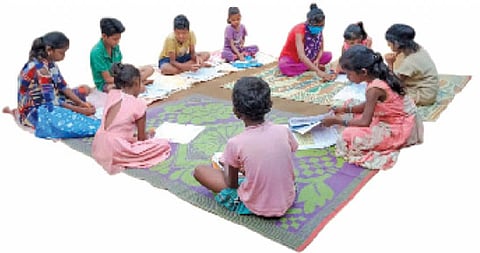

It is an exceptional sight in this time of mass school closures due to the novel coronavirus disease (COVID-19) pandemic. In the hinterlands of Rayagada and Kalahandi in Odisha, some 237 schools are running at full strength and in double-shifts.
Arguably, these children should have dropped out of formal education as most of their parents cannot afford a mobile phone for online classes. It is another matter that internet infrastructure in these districts is in a dismal state.
But an initiative by non-profit Livolink Foundation, an associate of Tata Trusts, has ensured that children continue with their formal education through a community-based teaching system. At the core of the initiative is the Covid Community Education Group (CCEG), a village-level group comprising panchayat members, anganwadi workers and parents.
Soon after the nationwide lockdown was announced, many college-going youths returned home. CCEG roped in these youths as “village volunteers” and entrusted them with the task of teaching children. The group also undertook a campaign to convince reluctant parents to allow their children to attend classes.
On the other hand, Livolink worked with district authorities to ensure regular supply of textbooks and other educational materials. Local education officials also provided preliminary training to the village volunteers so that they stick to the teaching schedule.
Now, classes are being held in open spaces — in somebody’s porch, on community land or under the shade of a tree. Instead of textbooks, the teaching-learning materials are locally available “things” like flowers, twigs or even toffees.
“While the open-air classes ensure physical distance, we are using resources that children interact with every day to build their interest in studies,” said Jayanti Hikaka, a village volunteer in Bissam Cuttack in Rayagada. According to Mohini Mohan, sarpanch of Tigidi panchayat, Bissam Cuttack, the strategy of roping in village youths has worked as most villages do not allow outsiders fearing COVID-19.
Krishna Vadaka, a farmer in Tankupadar village of Kalahandi, works as a village volunteer for at least four hours a day. “I am happy that children, particularly girls, are able to continue with their education. Otherwise, they would have been deployed in other works,” he said.
This was first published in Down To Earth‘s print edition (dated 1-15 December, 2020)